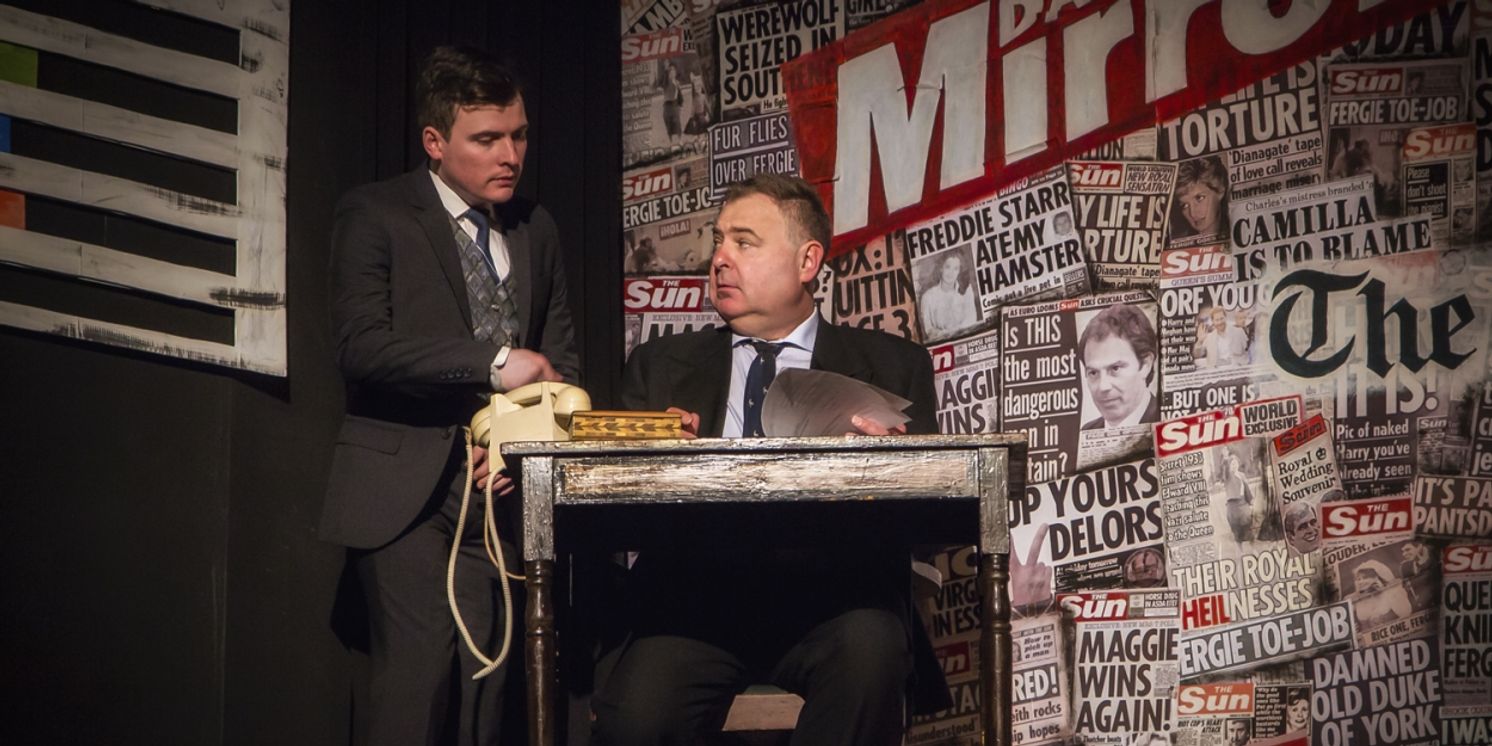Review: INK at Little Theatre, University Of Adelaide
Rupert Murdoch at The Sun

Reviewed by Ewart Shaw, Saturday 14th October 2023.
When I saw that Ink, in this epic production from the University of Adelaide Theatre Guild, was about Rupert Murdoch, I intended to begin my review by saying “South Australia has given the world many things worth mentioning, the stump jump plough, the rotary clothes hoist, the Balfours frog cake, and Rupert Murdoch.”
Having sat through James Graham’s long, funny, and confronting examination of Rupert’s purchase of The Sun newspaper, I’m reminded of Lord Acton’s dictum that power tends to corrupt and absolute power corrupts absolutely. Lord Acton, writing at the end of the nineteenth century, continued to say, ‘Great men are almost always bad even when they exercise influence and not authority.’
Rebecca Kemp and Robert Bell, co-directors, have pulled together a fine cast and trusted them with the action. It pays off handsomely.
The focus of the play is on the period in Fleet Street life, Fleet Street being the home of the major newspapers when Rupert purchased the Sun, an underperforming national daily and, in an almost unbelievably short time, turned its fortunes around, eventually making it the best selling newspaper in the UK and, indeed, the world. Bear in mind this was the early seventies.
The journalism business then was far more cutthroat. Just remember who the most famous, though fictional, business owner in Fleet Street had been; Sweeny Todd.
Joshua Coldwell is a striking figure as Rupert Murdoch, tall, handsome, and well-dressed. He exemplifies the new man in the UK newspaper business, ambitious and forward-thinking. Bart Csorba is outstanding as Larry Lamb. Grizzled of hair, with the energy of a coiled spring, his Lamb is the man Rupert seduces into the editorship of his new acquisition. Lamb knows the business and he poaches from rival papers, journalists and features writers who felt underappreciated. Gary George is excellent as Brian McConnell, discovered sleeping off his hangover in a Turkish bath. Steve Marvanek is equally impressive as Hugh Cudlipp, considered one of the greatest editors of his generation. From his desk on the upper level of the Little Theatre he sees his Daily Mirror lose to Murdoch in the quest for readership numbers. His smooth and well-dressed assistant is the always commendable Maxwell Whigham.
In the Little Theatre, the recruitment process becomes a dance routine. As each new recruit accepts Lamb’s offer, they dance. It is the worst example of dad dancing you will ever see, but slowly they become a chorus line, all in step. I say ‘dad dancing’. Only one woman is engaged. Kate Anolak is sturdy in the role of Joyce Hopkirk, the women’s editor, a woman who boldly confronts her colleagues and the audience by announcing that women masturbate. Sex becomes an important part of what the Sun has to offer. The page three girl, the scantily clad non-professional model, is also a part of the package, and you are shown briefly how these women were recruited and the sometimes sad impact it had on their lives. Sahra Creshull and Sarika Young, as gogo dancers and photo models, represent all the many young victims of the Sun’s dehumanising of women. Anolak briefly portrays Muriel Mackay, who was the wife of one of Murdoch’s executives. Her kidnapping and murder gave the newspaper a tragic scoop. There is a thought that the two murderers were after Murdoch’s wife Anna.
The Sun was directed to give the largest number of readers what they wanted, and it became a purveyor of tasty and addictive material, comfortably non-demanding, uneducational, anti-establishment, and psychologically stunting.
It’s a big, strong, and convincing cast. Joh Hartog, a fine director, is now a fine actor, as both Sir Alick Mackay and, briefly, Jacob Rees-Mogg. David Lockwood is better known to Adelaide audiences than the Bernard Shrimsley he portrays, as is the Ray Mills of Stuart Pearce. John Rosen is fine as Frank Nicklin but it’s a reminder that we don’t know who these people were, and what James Graham wants us to make of them. Charlie Milne is Beverley, the fashion photographer, and brings youthful energy to the cast. He’s also, briefly, the actor, Christopher Timothy, from All Creatures Great and Small, a name you might remember.
Norma Jean Ohlsson’s set of collapsed filing cabinets, and the wall of newspaper pages, gives atmosphere without clutter, and there are real typewriters.
At three and a quarter hours with interval, the play is long, and the scenes with the heavy metal printers, their varying unions, and their chapel fathers, could have been subbed out, costing Sam Wiseman and Ognjen Trisic their moments, dare I say it, in the sun.
For people who have been paying attention to the Advertiser over the last few decades, there’s an interesting historical lesson. Rupert made several changes to The Sun that he later applied to our local paper. The Sun became a tabloid, as did the Advertiser. Rupert introduced new production technology and established his ‘fortress’ at Wapping, as the Advertiser was later to move production out of the city.
I left the United Kingdom at about the time this play begins. I missed the major cultural shift it portends. The Murdoch empire had an heroic beginning, moving print journalism forward through new technologies but, since those halcyon days it’s been implicated in so many political confrontations, here in Australia, the UK, and the United States of America. There are two quotes that spring to mind: “No one ever went broke underestimating public taste” and “Look on my works ye mighty, and despair.”
American politics is a shambles. Political commentators online speak of legacy media, they mean print journalism, as the internet, and Youtube podcasts, give ordinary folks a platform for their opinions to counter the amazing and disturbing presentation of such networks as Sky News.
Reader Reviews
Videos


